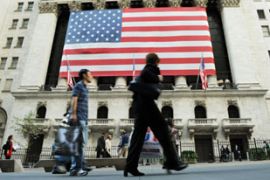Markets edgy amid recession fears
Investors cash in gains after two strong days as US says it will buy stakes in banks.

Markets in Australia, South Korea, China and Taiwan also fell on Wednesday, though Japanese share prices ended the day up 1.06 per cent, extending the previous day’s record gains.
Share prices in Europe plunged as fears of a coming recession grew.
At close, Frankfurt’s Dax 30 index slipped by 6.49 per cent to 4,861 points, French stocks dipped 6.82 per cent to 3,381 points and London’s FTSE100 finished down 7.16 per cent to 4,079 points.
“After the colossal gains achieved at the start of this week, it would seem that the hangover has kicked in and investors have sobered to the reality that recession is here,” Andrew Turnbull, senior sales manager at ODL Securities, said.
Recession
The head of San Francisco’s branch of the US Federal Reserve on Tuesday said that the US economy “appears to be in recession”.
“The recent flow of economic data suggests that the economy was weaker than expected in the third quarter, probably showing essentially no growth at all,” Janet Yellen said.
| IN DEPTH | ||
|
|
“Growth in the fourth quarter appears to be weaker yet, with an outright contraction quite likely,” she said. “Indeed, the US economy appears to be in a recession.”
Recession is broadly defined in the United States as more than two quarters of decline in real gross domestic product.
“All the good news has now come out,” Masatoshi Sato, a broker at Japan’s Mizuho Investors Securities, said referring to the bailouts and rescues. “Attention has now shifted to the real economy.”
A handful of countries, including New Zealand, Ireland and Singapore have already confirmed that they are in a recession, while Japan and Germany, the world’s second and third-biggest economies, have said they were on the brink of a downturn.
“We have to expect a weakening of growth,” Angela Merkel, the German Chancellor, said on Wednesday. She added that the slump would not be a sustained economic downturn.
Merkel made the comments ahead of a European Union summit meeting, at which Gordon Brown, the British prime minister, will call for changes to the global economic system.
“If we are going to sort out global financial problems that are recognised to be global, we need better ways of doing this,” he said after meeting Jose Manuel Barroso, the European Commission president.
“The IMF has got to be rebuilt as fit for purpose of modern world. We need an early warning system for the global economy.”
Emergency fund
Meanwhile, South East Asian nations, along with Japan, China and South Korea, agreed to set up a multi-million fund to buy up debts and support the region’s banks, Gloria Arroyo, the Philippines president, said.
“The facility can be used to purchase what the bankers call toxic assets and recapitalise troubled financial institutions and private companies,” she said.
Arroyo said that the World Bank had committed to initially provide $10bn to the fund.
Analysts said there was no immediate need to recapitalise banks or companies in Asia as few were exposed to the crisis, although Asian financial markets have been badly hit by contagion.
“There is no such pressing need in Asia yet for such a fund. But it is a good development as it will prepare Southeast Asian nations to better take care of any banking problems that may occur,” Ritesh Maheshwari, a primary credit analyst at Standard & Poor’s rating agency, said.
Governments around the world have pledged around $3.2 trillion in a variety of schemes to combat the worst financial crisis in decades which has caused the failure of several financial institutions around the world.
Also on Wednesday. Iceland’s central bank cut interest rates by 3.5 per cent from a record high of 15.5 per cent as it struggles to deal with the impact of the global credit squeeze on its economy, which is heavily weighted to the banking industry.
‘Objectionable’
Henry Paulson, the US treasury secretary, said that the plan to buy stakes in financial institution was “objectionable”, but necessary.
“Today’s actions are not what we ever wanted to do,” he said. “But today’s actions are what we must do to restore confidence to our financial system.
Nine banks have agreed to join the government programme, including Citigroup, Goldman Sachs, Morgan Stanley and Bank of America.
Banks signing up will have to agree to limits on executive pay and other benefits, Paulson said.
The plan will also temporarily guarantee all non-interest bearing transaction accounts, providing some relief for small businesses, and most new debt issued by insured banks .
“These measures are not intended to take over the free market, but to preserve it,” Bush said of the government intervention that many economists regard as contrary to the principles of free-market capitalism.
